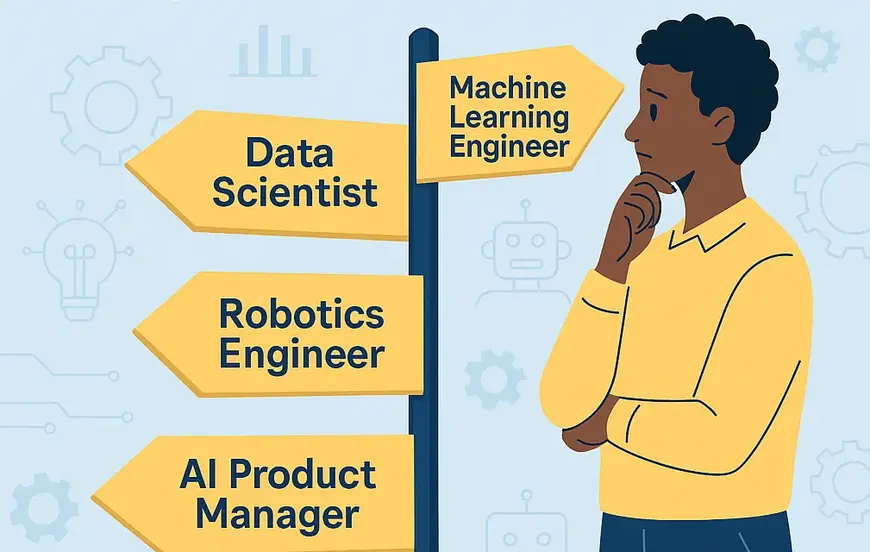AI career opportunities are experiencing explosive growth with experts predicting over 30% expansion in the next decade, making this an exciting time to enter the field. However, navigating the diverse landscape of AI roles can feel confusing and daunting for newcomers. With AI jobs spanning four main categories – engineering, data, business, and client-facing roles – finding the right path requires careful consideration of your interests, skills, and career goals.
The AI field offers unprecedented opportunities for professionals willing to adapt and learn, but success requires understanding which roles align with your strengths and aspirations. Whether you’re drawn to problem-solving and building systems, analyzing data and discovering trends, or bridging the gap between technology and business, there’s an AI career path that can leverage your unique talents.
The key to success lies in identifying what excites you most about AI, assessing your existing skills, and being open to learning new technologies. With the right approach, you can find a fulfilling AI career that matches your interests while positioning yourself for long-term growth in this rapidly evolving field.
The Engineering Path: Building AI Solutions from the Ground Up
Engineering roles are among the most in-demand and competitive positions in the field, perfect for those who love problem-solving and building things from scratch. These roles require strong technical skills and the ability to work with complex systems while maintaining a focus on practical applications.
AI Engineers develop tools that help businesses make better decisions, streamline processes, and boost profitability. This relatively new role offers significant flexibility, as job descriptions vary widely depending on the company and specific needs. Success requires programming skills, machine learning concepts, and the ability to quickly adapt to new AI tools and technologies.
Machine Learning Engineers apply ML techniques to solve specific problems, ranging from building predictive models to designing algorithms that improve over time. This hands-on technical role involves working through the full data science lifecycle, from data collection and cleaning to model training and deployment.
The Data Path: Analyzing Information and Driving Business Decisions
Data roles are ideal for those who love analyzing information, discovering trends, and helping businesses make data-driven decisions. These positions form the foundation of AI systems by ensuring data is properly collected, processed, and analyzed.
Data Engineers serve as the architects of data infrastructure, building systems that collect, store, and process raw data into usable formats for analysis. This role requires strong skills in databases, data processing, and data warehousing, as data engineers create the pipelines that power modern AI systems.
Data Scientists analyze complex data to identify trends, make predictions, and provide actionable insights that help businesses make informed decisions. This role requires a combination of statistical skills, machine learning expertise, and strong communication abilities to explain findings to non-technical stakeholders.
Data Analysts work more closely with interpreting data and creating reports that help businesses understand performance. This role typically requires less technical expertise than data scientists or engineers, making it an excellent entry point for those new to the field.
The Business Path: Strategic AI Implementation and Management
Business roles are perfect for those interested in the strategic side of AI implementation and management. These positions involve working closely with technical teams and business stakeholders to ensure AI projects deliver real value to organizations.
AI Product Managers ensure that AI tools solve real-world business problems by working with engineers, data scientists, and company leaders to define product features, manage development, and ensure successful deployment. This high-responsibility role requires deep understanding of AI technologies combined with strong communication and leadership skills.
Business Analysts analyze how AI tools can streamline processes or solve business problems, serving as liaisons between technical teams and executives. This role requires strong understanding of both business operations and AI capabilities, making it ideal for those who can bridge technical and business worlds.
The Client-Facing Path: Connecting AI with Real-World Applications
Client-facing roles are perfect for those who love working with people and bridging the gap between AI technology and practical applications. These positions require strong communication skills and the ability to translate complex technical concepts into understandable language.
AI Advocates help educate the public about AI, explaining how it can solve problems and ensuring that growth benefits everyone. This role may involve public speaking, writing articles, or working on public policy, making it ideal for those passionate about AI’s societal impact.
AI Sales Engineers help clients understand how AI solutions can benefit their businesses by translating complex AI concepts into language that business leaders and customers can understand. This role combines technical expertise with sales skills, perfect for those who enjoy talking to people and seeing how AI fits into business strategy.
AI Consultants work directly with clients to design and implement AI solutions that solve specific business challenges. Unlike sales engineers who focus on selling products, consultants work on creating tailored AI strategies for clients, requiring a mix of technical expertise and business insights.
Market Demand and Competition: Understanding the Landscape
Different roles vary significantly in terms of market demand and competition levels across the AI field. Engineering roles tend to be the most competitive, with AI Engineers having 1,346 job listings and Machine Learning Engineers having 1,278 positions available on LinkedIn.
Data roles show strong demand across all levels, with Data Engineers having 4,426 listings, Data Scientists having 3,242 positions, and Data Analysts having 3,981 opportunities. These roles offer good entry points for those new to the field while providing pathways to more advanced positions.
Business roles show moderate demand, with AI Product Managers having 5,592 listings, though entry-level positions are rare and typically require prior product management experience. Client-facing roles tend to have fewer opportunities, with AI Advocates having only 99 listings and AI Consultants having 813 positions.
Hire for AI’s Most In-Demand Roles
From AI engineers to data scientists and product managers, demand for AI talent is surging across industries. Employers can secure top professionals in competitive fields by posting their roles where ambitious candidates are actively searching. Post your job on WhatJobs today and connect with skilled talent ready to meet the market’s growing AI needs.
Post a Job Free for 30 Days →Skills Development: Building Your AI Career Foundation
Success in AI careers requires continuous skill development and learning to remain competitive in this rapidly evolving field. The specific skills needed vary by role, but certain foundational competencies are valuable across all AI positions.
Technical skills include programming languages like Python and R, understanding of machine learning concepts, and familiarity with AI tools and frameworks. Soft skills like communication, problem-solving, and adaptability are equally important for success in AI careers.
The key to skill development is focusing on areas that complement rather than compete with AI capabilities. This means developing expertise in areas where human judgment, creativity, and interpersonal skills provide significant value.
Career Transition Strategies: Moving into AI from Other Fields
AI careers are accessible to professionals from various backgrounds, not just those with technical degrees. The key is identifying transferable skills and finding roles that align with your existing expertise while providing opportunities to learn AI-specific competencies.
Those with business backgrounds can transition into AI Product Management or Business Analyst roles, while those with communication skills can pursue AI Advocate or Sales Engineer positions. Technical professionals can move into AI Engineering or Machine Learning roles, while those with analytical backgrounds can pursue Data Science positions.
The transition process involves identifying your strengths, learning AI-specific skills, and gaining experience through projects, internships, or entry-level positions. Many successful AI professionals started in related fields and gradually developed AI expertise.
Entry-Level Strategies: Getting Your Foot in the Door
Entry-level professionals require strategic approaches to overcome initial barriers in the AI field. Many AI roles require experience, but there are several strategies for gaining the necessary qualifications and experience.
Consider applying for multiple roles even if you don’t feel 100% qualified, as opportunities often come from unexpected places. Look for less competitive positions that can serve as stepping stones toward your dream job, and focus on developing skills through projects, courses, and networking.
Entry-level positions in data analysis or business analysis can provide valuable experience and exposure to AI applications, while internships and contract work can help build relevant experience and industry connections.
Long-Term Career Planning: Building Sustainable AI Careers
Long-term planning and continuous adaptation are essential to remain relevant in this rapidly changing field. The key is developing both technical and soft skills while maintaining flexibility to adapt to new technologies and market demands.
Focus on building expertise in areas where human judgment and creativity remain essential, such as strategic thinking, communication, and problem-solving. Develop skills in AI oversight, prompt engineering, and result interpretation to work effectively with AI systems.
The most successful AI professionals are those who can effectively bridge the gap between human and artificial intelligence while maintaining the unique value that human workers bring to their roles.
Frequently Asked Questions
What are the main AI career opportunities available?
AI career opportunities span four main categories: engineering roles (AI Engineer, ML Engineer, MLOps), data roles (Data Engineer, Data Scientist, Data Analyst), business roles (AI Product Manager, Business Analyst), and client-facing roles (AI Advocate, Sales Engineer, AI Consultant).
How competitive are AI career opportunities in the current market?
AI career opportunities vary in competitiveness, with engineering roles being most competitive, data roles showing strong demand, business roles having moderate demand, and client-facing roles having fewer opportunities but unique value propositions.
What skills are needed for AI career opportunities?
Skills needed include technical competencies like programming and machine learning, soft skills like communication and problem-solving, and the ability to work effectively with AI systems while maintaining human judgment and creativity.
How can I transition into AI career opportunities from other fields?
Transition strategies include identifying transferable skills, learning AI-specific competencies, gaining experience through projects or entry-level positions, and focusing on roles that align with your existing expertise while providing growth opportunities.
A Real-World Example: Maria’s AI Career Journey
Maria Rodriguez, a 32-year-old marketing professional from Austin, exemplifies how AI career opportunities can transform careers when approached strategically. After working in traditional marketing for eight years, Maria decided to transition into AI Product Management.
“I realized that AI career opportunities were growing rapidly, and I wanted to be part of this transformation,” Maria explains. “I started by taking online courses in AI and machine learning while continuing to work in marketing, then gradually took on projects that involved AI tools.”
Maria’s transition involved developing technical knowledge while leveraging her existing business and communication skills. She completed several AI certification programs and worked on side projects that demonstrated her ability to bridge technical and business worlds.
“AI career opportunities taught me that the key is finding where your existing skills add value to AI implementation,” Maria says. “My marketing background actually became an asset because I understood how AI could solve real business problems.”
Within two years, Maria secured a position as an AI Product Manager at a tech startup, where she now leads the development of AI-powered marketing tools. Her experience demonstrates that successful transitions into AI careers require strategic planning, continuous learning, and the ability to connect existing expertise with new opportunities.




